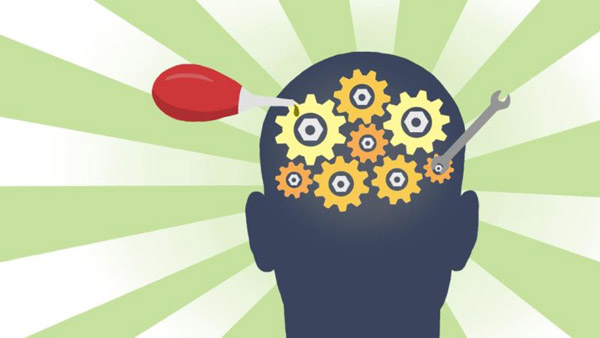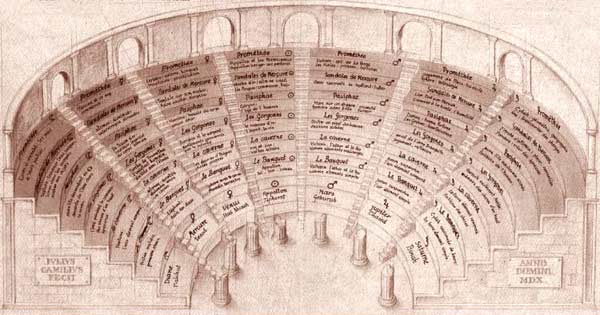当前位置: Language Tips> 英语学习专栏
急匆匆地跑去隔壁房间,却忘了自己是来拿什么的;点开浏览器,光标定在搜索框里,突然不记得自己要查什么;看不清东西时想找自己的眼镜,却不记得什么时候把它摘掉了,也想不起来丢在了哪个角落;明明是昨天刚刚认识的人,却死活想不起对方的名字……你遇到过这些情况吗?

By Melanie Pinola
木沐 选 张健 注
Remembering things, like names, dates, and other fine details is a skill—one that you can sharpen and hone. Here are eight memory boosting techniques everyone can learn.
1. Visualize what you want to grab from a room before you go to get it.
There’s something about walking into another room or passing through a doorway that resets our short-term memory and makes us forget what we went there for. If you visualize your purpose before you leave the current room, you’ll increase your chances of remembering what you want. It also applies to the digital world: before you open up a new browser tab and forget why you opened it, picture your purpose. As a former can’t-find-my-glasses person, I’ve been using a similar technique successfully: When putting my glasses down, I now focus sharply on what the tabletop looks like and the things on it so I’ll remember where I put it. Often we have to be proactive when it comes to remembering things.
2. Learn the chunking technique.
We can only store a limited number of things in our short-term memory—about four to seven different items, according to most estimates. The chunking technique can help us get past this limitation: group several items into a larger whole. This is one of the techniques I learned when training for the USA Memory Championship to try to remember ridiculously long sequences of numbers and pages of poems in a few minutes.
3. Leverage the power of music.
We forget names and numbers so easily, but lyrics to our favorite songs or nursery rhymes from childhood? They tend to stick. Music helps us memorize things through alliteration and rhythm. If you want to learn a foreign language, try training with music videos with subtitles or even Karaoke. Lyrics Training offers video resources but there’s also, of course, YouTube. Singing in general can help boost your brain.
4. Create mnemonic pegs to remember long lists.
Even without the music background, you can use rhyme and rhythm to remember things like shopping lists or lists of all the US capitals. You peg items to things that rhyme. E.g., 1 is a gun (visualize the first item being fired from a gun), 2 is a shoe, visualize the second item inside a shoe, and so on.

5. Use the “Memory Palace” technique.
This is another technique used by memory champs: build a memory palace where you visualize the things you want to remember and associate them with a place you remember vividly. If your home is your mental palace, for example, you can remember the order of your grocery list by picturing a giant jug of milk greeting you at the front door, slices of bread lining your hallway, and so on as you walk through it.
6. Remember people’s names by forcing yourself to interact with them differently.
Of all the annoying times our memory fails us, forgetting someone’s name might be the worst. It’s just that our basic working memory isn’t that great. However, if we try to make connections between the abstract name and the person, we’ll be more likely to remember the name. It takes a little work: try asking a person you just met a question to give you time to repeat his or her name in your head, introduce the person to someone else (forces you to repeat their name), make better eye contact, repeat the person’s name at the end of the conversation, and create a visual hook for their name using their face.
7. Take care of your health and learn new skills.
Unfortunately, our memory deteriorates as we get older. Taking care of our basic health, though, can go a long way towards optimizing our health. That means reducing the stress in your life, exercising and staying fit, and keeping your brain healthy too by learning new skills.
8. Pay attention and practice.
Better memory comes down to three things: motivation, observation, and mechanics. MOM. Most of us forget people’s names because we aren’t really paying attention or, perhaps, don’t care. For the mechanics part, find a trick that works for you (like one of the above) and keep using it. As for practice: A couple of minutes at night reviewing the details and names from the day can strengthen your memory. Take notes as you read. Start relying on your own memory rather than technology.
Vocabulary
1. boost: 增强,提高。
2. hone: 磨练,锤炼。
3. visualize: 使形象化,设想;grab: 拿,取。
4. reset: 重新设置;short-term memory: 短期记忆。
5. browser tab: 浏览器选项卡。
6. tabletop: 桌面,台面。
7. proactive: 先发制人的,主动的。
8. chunking: 分块,组块。
9. “组块记忆法”能帮我们突破这一极限:将多个记忆对象组合为一个更大的“记忆块”。
10. championship: 锦标赛;ridiculously: 荒谬地;sequence: 顺序,次序。
11. leverage: 运用。
12. lyric: 歌词,通常用复数形式;nursery rhyme: 儿歌,童谣。
13. alliteration: 头韵,头韵法;rhythm: 节奏,韵律。
14. subtitles: 字幕。
15. mnemonic peg: 这里指“助记代号”,mnemonic 意为“帮助记忆的”,peg意为“钉,栓”。
16. 这是记忆冠军采用的另一种记忆法:在脑海中构造一座记忆宫殿,将记忆对象与你印象深刻的地方联系起来。champ: 即champion,冠军;vividly: 生动地,清晰地。
17. grocery: 食品杂货;jug: 罐,壶;hallway: 门厅。
18. hook: 吊钩,挂钩,此处指“关联,联系”。
19. deteriorate: 衰退,恶化。
20. optimize: 使最优化,使尽可能完善。
21. come down to: 归结为;mechanics: 方法,技巧。
22. trick: 窍门,诀窍。
(来源:英语学习杂志 编辑:丹妮)
上一篇 : 观《老炮儿》有感
下一篇 :
关注和订阅


电话:8610-84883645
传真:8610-84883500
Email: languagetips@chinadaily.com.cn